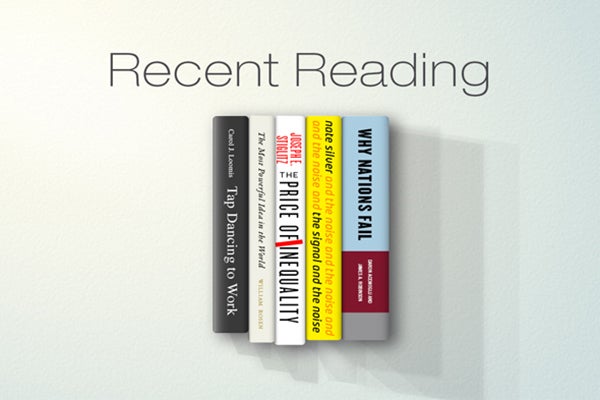Winter’s Tales
A year-end reading list
Some books on predictions, inequality, prosperity, steam and Warren Buffett.


The holidays in December were a great time to relax, spend time with family and friends, and catch up on some reading. I had a number of books that I’d been wanting to get to and that I had a chance to read last month. They included a couple of books that I thought were pretty important and that I want to write longer reviews of soon, but right now I’d like to give you some brief reactions to them and some other books you might want to consider reading in the new year.
Anyone interested in politics may be attracted to Nate Silver’s The Signal and the Noise: Why So Many Predictions Fail—but Some Don't. Silver is the New York Times columnist who got a lot of attention last fall for predicting—accurately, as it turned out–the results of the U.S. presidential election. This book actually came out before the election, though, and it’s about predictions in many domains besides politics. Silver knows a lot about baseball, and I especially liked his explanation of hold’em poker. A few pages – where he talks about how early computers supposedly made everything less efficient—are utter nonsense. I wish he had gone into more depth on some things, like why it is that voters are increasingly polarized. I liked the book, though I wish he’d gone deeper on a number of topics.
I have mixed feelings about The Price of Inequality: How Today’s Divided Society Endangers Our Future by Joseph E. Stiglitz. Stiglitz’s contributions are important in that he really does a good job of articulating the issues of inequality and the economic factors that underlie it. He raises important questions about whether it’s getting harder for people in the U.S. to move up the economic ladder. He makes a pretty rational case for keeping things like the estate tax and for increasing taxes as part of how you close the budget deficit. On these ideas, I found a lot of common ground with Stiglitz. But he seems to think that government is totally benign, and he is very skeptical of the private sector. The private sector’s obligations and its relative contributions to the economy are an interesting topic for discussion. But Stiglitz seems to demonize the category as a whole. I wonder if many of his policy solutions would make things worse by incentivizing business to put even more money and effort into currying favor with Washington.
I read two books that raise big, interesting questions about social change and technological progress. I’m planning to write longer reviews of each of these books, but let me flag them for you now.
One is Why Nations Fail: The Origins of Power, Prosperity, and Poverty by Daron Acemoglu and James A. Robinson.The topic of this book is why some countries have prospered and created great living conditions for their citizens while others have not. This is an important topic, which I care a lot about. The book makes an appealing argument that economic development depends on political institutions that protect individual rights. It is well written and very easy to read with lots of interesting historical stories about different countries. But it is a major disappointment. Its analysis is vague and simplistic. I’ll explain more in a longer review.
I just finished reading The Most Powerful Idea in the World: A Story of Steam, Industry and Invention by William Rosen. It focuses on the Industrial Revolution basically from the Newcomen atmospheric engine in 1712 to the Stephen Rocket Locomotive in 1850. It does a great job of explaining how thousands of innovations were driven during this period by many elements coming together: increased literacy, patents, societies, scientist/tinkerers, the cotton industry, trade/shipping, measurement, etc. It is a great book although its helps to have an interest in how steam engines actually work since it chronicles how they changed over time in some depth. This book is very worthwhile, and I’ll have more to say about it also in a longer review.
I already posted a full review of Tap Dancing to Work, a collection of writings about Warren Buffett put together by his friend Carol J. Loomis. I can’t resist an opportunity to recommend this book again. It's very, very good. The pieces go back more than 40 years some of them, and it’s very interesting to see how Warren framed things years ago and how he’s dealt with certain challenges since. You get to see how consistent Warren’s framework has been, how he has always looked at the world in terms of integrity and financial valuation. There are some speeches in here that offer great insights into how Warren evaluates stock markets over time and how to assess the margin of safety available in investments at any point in time. I thought the book was super good.


